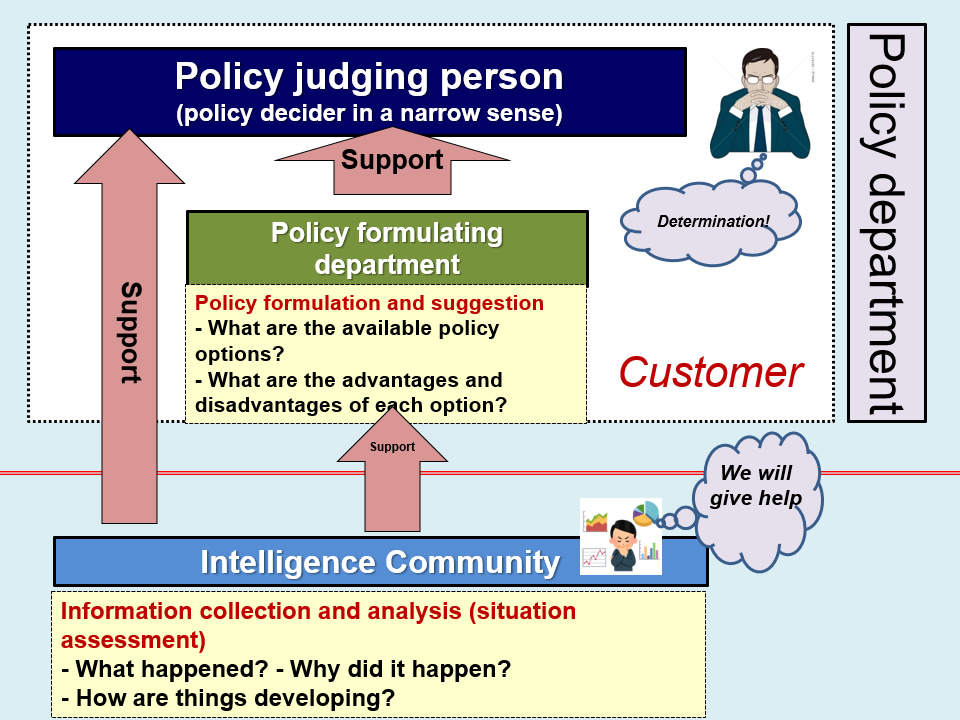My specialty is the study of intelligence in the theory of national security. In fact, the relation between experts (the intelligence community) and policymakers is one of the important study themes in the study of intelligence. This article gives a brief introduction to discussions about what the relation between experts and politics should be, which we have had in the study of intelligence. Though not all knowledge of the study of national security can be applicable to the current problem of COVID-19, I am glad if this paper provides you with any help.
1. What is intelligence? A system to support decision-making on national security
“Intelligence” means intellect and the like, in general. On the other hand, in the field of the national security studies, “intelligence” is interpreted as a system of providing a necessary situation assessment for supporting a judgment which a state’s supreme leader (e.g., a prime minister or president) makes regarding national security. Therefore, the study of intelligence is a branch of learning that studies what such a system should be.
It is a little hard to understand, so I will explain it by using another example. The weather forecast, though it is not related directly to national security, has functions similar to those of intelligence. Many people may watch the weather forecast every morning to decide whether they should go to work with an umbrella or should do their laundry. In that decision, it is difficult to make an appropriate judgment of the issue of umbrella or laundry only from weather data, such as temperature, atmospheric pressure and wind force, which is material information. An expert such as a weather forecaster will carry out an analysis based on weather data (material information) and will present the probability of precipitation, which is a situation assessment, to viewers. Viewers, namely ordinary people not experts, become able to make an appropriate judgment on the issue of carrying an umbrella or doing laundry by being provided with a helpful situation assessment (i.e. the probability of precipitation) generated from processed material information.
Regarding national security, it is extremely difficult for the supreme leader to make an appropriate judgment based only on material information. Support by a system of providing situation assessment to support a judgment which is equivalent to the weather forecast in the previous example; that is, support by intelligence is essential to making an appropriate decision.
A more specific overview of the process of decision-making and the role of intelligence is being given below.
2. Three steps in decision-making: situation assessment, policy formulation and policy decisions (determination)
It is considered that in the process of a state’s decision-making on national security, there are three steps: situation assessment, policy formulation, and policy decisions (determination) (* see the diagram below).

Suppose that a prompt report on the possibility that a certain neighboring country has carried out a nuclear test has arrived on the state’s supreme leader’s desk. It is difficult to judge how the government should respond to the situation only from that prompt report. To make an appropriate judgment, situation assessment is first needed regarding what has actually occurred (facts confirmation), why such a thing has taken place (background analysis), and what kind of things will occur in the future (future prediction). In addition, it is necessary to have discussion about some policy options (e.g., military retaliation, diplomatic dialogue, or waiting and seeing) which the country should take as well as about the advantages and disadvantages of those policy options, namely policy formulation, based on that situation assessment. The supreme leader becomes able to make an appropriate determination (a policy decision) only when he/she goes through that process.
It is the intelligence community that is in charge of a system of providing situation assessment to support the first step of a series of decision-making as mentioned above; that is, policy formulation by policy formulating departments and judgement by policy deciders. In general, countries have a group of various organizations in charge of those operations (intelligence community). In Japan, the key members of that group include the Cabinet Intelligence and Research Office of the Cabinet Secretariat, the Ministry of Defense, the Ministry of Foreign Affairs, the National Police Agency, and the Public Security Intelligence Agency. In other countries, the CIA of the US and the SIS (so-called MI6) of the UK are involved in such intelligence operations. On the other hand, the second step, namely the task of formulating policies based on situation assessment (policy formulating departments), is taken by the National Security Secretariat of the Cabinet Secretariat and other organs.
In general, employees who are involved in the operations of the intelligence community and policy formulating departments in the government are considered as experts in the operations under their charge. On the other hand, policy deciders are political leaders elected through a democratic procedure (e.g., a president and a prime minister) in democracies, in general.
3. Securing of objectivity of intelligence – Separation of policy and intelligence
The objectivity of intelligence being secured is very important for intelligence to perform its functions effectively. If its objectivity is not secured, that is, if intelligence is distorted, there is quite a possibility that policy deciders will make an error of judgment. It is such a case where a distorted situation assessment which shows that there is a strong possibility of winning is sent to policy deciders in wartime, though there is a strong possibility of losing, objectively.
There are various factors in the background of distorted intelligence. For example, there are cases where the intelligence community may distort a situation assessment with the intention of leading a policy by deceiving policy departments or of not incurring displeasure by reporting any situation assessment with which policy deciders may not be satisfied (distortion under the leadership of the intelligence community). On the other hand, there are cases where a policy department may put pressure on the intelligence community to conduct a situation assessment to justify a policy to its liking (distortion under the leadership of policy departments). It seems that intelligence was actually distorted during the Vietnam War and the Iraq War (2003) in the US.
In order to maintain the objectivity of intelligence by avoiding those situations, the intelligence community ought to be separated from policy departments (policy deciders and policy formulating departments) organizationally and functionally in terms of science. In other words, the intelligence community in charge of situation assessment ought not to participate in policy formulation or policy judgment. This is because, if the intelligence community participates in policy formulation or policy decisions, the intelligence community tends to have a preference (likes and dislikes) for a specific policy, which may impair the objectivity of situation assessment. In fact, in major countries, including Japan, the US and the UK, intelligence organs are different organizations from organs in charge of policy formulation and do not participate in policy decisions, as a rule.
In actual operations, the intelligence community ought to only present situation assessment to policy departments and not to express their opinion on the pros and cons of a policy (which policy option should be taken). On the other hand, policy departments ought to only request an objective situation assessment from persons in charge of intelligence and to refrain from further asking those persons for opinions on the pros and cons of a policy.
4. For what will intelligence (experts in situation assessment) assume responsibility?
In that process of policy decisions, for what will the intelligence community and policy deciders each assume responsibility? That matter is not always specified in laws and regulations. Speaking as an ideal in science, the intelligence community (experts in situation assessment) may be responsible only for providing policy departments with the objectively best situation assessment at the time of situation assessment. On the other hand, policy deciders may be fully responsible for policy decisions and the results thereof. I will give a more detailed explanation in that respect in the following.
First, the intelligence community is understood not to be responsible for unraveling the truth 100 percent. The intelligence community’s duty is only to provide the objectively best situation assessment at the time. In reality, it is almost impossible for even an expert to unravel the truth 100 percent in connection with the operations under his/her charge. Regarding public documents of situation assessment that have been drawn up by the US CIA, for example, it is not rare that a conclusion that the possibility of XX is about YY% is stated in them. On the other hand, policy departments ought to understand that they cannot expect the intelligence community (experts) to unravel the truth 100 percent no matter how good the intelligence community is.
In general, it is understood that a policy decision should be made based on due grounds (this is called a policy decision based on evidence). However, it does not necessarily mean that a prediction in situation assessment which is a precondition for a policy decision must be clearly guaranteed 100 percent. In fact, in the field of national security, there are quite a few cases in which policy deciders have to make a judgment at the stage where the accuracy of situation assessment is only about 50% to 60% at the time (see the case referred to in Section 5 below).
Second, the intelligence community is not considered responsible for a policy decision and the results thereof. For example, in the case of a defeat in a war, it is policy deciders who assume responsibility for the determination to start war and the resulting defeat, and the intelligence community is interpreted not to be especially responsible for the determination to start war and the defeat (if they have provided policy departments with the objectively best situation assessment).
It assumes that the only right policy decision is not always made based on one situation assessment. Conversely, it is possible that various determinations (policy decisions) are made based on the same situation assessment according to a difference in policy deciders’ values and philosophies. For example, when a situation assessment shows that the possibility of winning the war is 30%, while a policy decider may determine to postpone starting war according to values of giving top priority to securing lives, another policy decider may determine to start war according to values of annihilation being better than surrender. Moreover, when a situation assessment shows that the possibility of winning the war is 70%, while a policy decider may determine to start war according to values of giving top priority to territorial expansion, another policy decider may determine to postpone starting war (even if there is a chance of military victory) according to values from the thought that people should avoid a war in every way possible from a humanitarian point of view. In general, the more elements of interest taken up for discussion (that should be weighed), the wider the range of a decision may be.
As mentioned above, an actual policy decision on national security is made based not only on a situation assessment but largely on policy deciders’ values and philosophies. On the other hand, the intelligence community is not connected with values and philosophies (the separation of policy and intelligence). Therefore, the intelligence community may not be called to account for a decision and the result thereof beyond the responsibility for providing the best situation assessment.
That view is fundamentally common to the thought of the separation of policy and intelligence as mentioned above; that is, the thought that the intelligence community in charge of situation assessment ought not to participate in policy formulation or policy judgment. In other words, it can be said that not participating and not being called to account are inseparably related. Furthermore, as mentioned in Section 3, the intelligence community’s not participating in policy is to secure the objectivity of intelligence. Therefore, the intelligence community’s not assuming responsibility for a policy decision and the results thereof and their assuming responsibility for securing the objectivity of situation assessment are inseparably related.
5. Instead of a conclusion – The case of Operation Osama bin Laden Search and Destroy (May 2011)
Finally, I am concluding this article with the introduction of a case of high-level decision-making on security that actually occurred in history. On May 2, 2011, Osama bin Laden, who was the originator of Al Qaeda, a terrorist organization of Islamic extremism, and was hiding out in Pakistan, was killed in a raid by a special unit of the US armed forces. Former President Obama explained the details of the decision to carry out the said operation in a news interview later as follows.
“About the summer of 2010, the intelligence community (Director Panetta of the CIA) reported that we had found a house that seemed to be the hideout of bin Laden in Pakistan. Afterward, the CIA continued to confirm whether or not bin Laden really was there and finally found the possibility of his being there to be only about fifty-fifty.”
“Based on that situation assessment, I consulted about which policy option we should take with the Cabinet ministers concerned (Vice President Biden, Secretary of State Clinton, and Secretary of Defense Gates) and others. The following were the policy options presented: (i) to carry out a raid operation by a special unit, (ii) to carry out only an air bombing without carrying out a raid operation, and (iii) to wait and see for the time being until the accuracy of intelligence (situation assessment) increases. We discussed the advantages and disadvantages of those options.”
“No conclusion was drawn through the discussion among the Cabinet ministers. I think that it is natural that no consensus was built as the Cabinet ministers each discussed it from a different viewpoint. Finally, I (President) took over the discussion and determined to take the option to carry out a raid operation after I thought about the matter alone for a night.”
The possibility that the story was a little dramatized cannot be denied. However, isn’t it a case that clearly shows the state of three steps of situation assessment, policy formulation, and policy decisions as well as the duties of actors in charge of those three steps and the relationship among those actors?
Moreover, the case did not come into question as the raid operation was successful. However, if the operation had failed (e.g., a case where bin Laden was not in the hideout or where serious damage was caused to the US armed forces in the course of the raid operation), who should have assumed responsibility for it? Though it is just a hypothetical story, in terms of the study of intelligence as explained in this article, President Obama, who made the judgment, should assume responsibility for the case (In similar cases in history, some cases did not lead to an end according to the scientific and theoretical way of thinking).
Reference
Kobayashi, Y. (2014). Fundamentals of Intelligence (2nd ed.). Tachibana shobo.
‘President Obama Bin Laden raid is ‘most important single day of my presidency,’ NBC Rock Center with Brian Williams, May 2, 2012.
*The information contained herein is current as of May 2021.
* The contents of articles on Meiji.net are based on the personal ideas and opinions of the author and do not indicate the official opinion of Meiji University.
* I work to achieve SDGs related to the educational and research themes that I am currently engaged in.
Information noted in the articles and videos, such as positions and affiliations, are current at the time of production.


